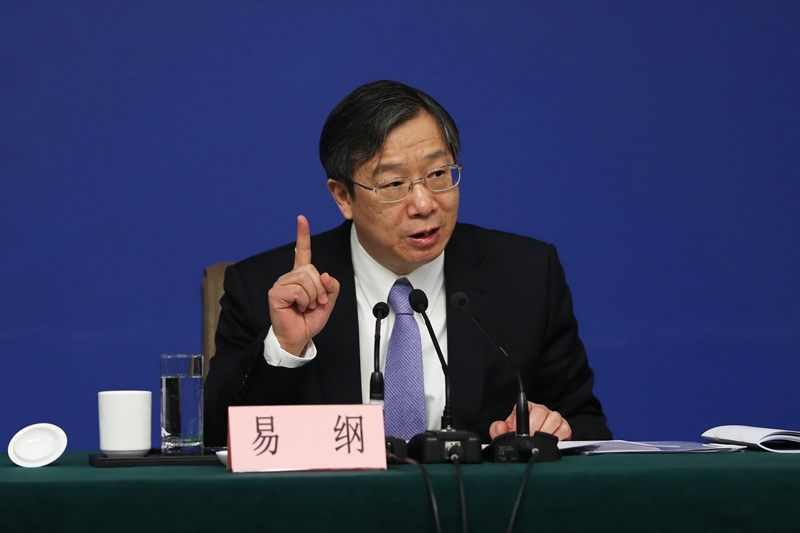Central Banker Calls for Calm as Trade War Sparks Stock Sell-Off

* Yi said the central bank is prepared with policy tools and will use a combination of monetary tools to maintain liquidity at an appropriate level
* The central bank made a net injection of 250 billion yuan into the market through MLF and reverse repos
China’s central bank Governor Yi Gang called for investors to stay “calm and rational” after the domestic stock market tumbled to a two-year low in response to escalating trade frictions with the U.S.
Yi, governor of the People’s Bank of China, said Tuesday that China’s economy has growing resilience and capability to cope with external shocks and the central bank is prepared with policy tools. As Chinese stocks dropped Tuesday, the central bank injected liquidity into the market.
“China is in good position to cope with all kinds of trade frictions,” given its huge domestic market and strong growth momentum, Yi said in an interview with the Shanghai Securities News published on the central bank’s website.
In a surprise move, the PBOC Tuesday loaned 200 billion yuan ($31 billion) to financial institutions via its medium-term lending facility (MLF). Along with reverse repos, the central bank made a net injection of 250 billion yuan into the market, highlighting concerns over liquidity amid slower growth and trade tensions, analysts said.
Chinese mainland shares tumbled on Tuesday after U.S. President Donald Trump threatened to impose tariffs on $200 billion of Chinese exports, in addition to the increased duties on $50 billion of Chinese exports announced last week.
Fears about the trade war between China and the U.S. have rocked global markets. Hong Kong’s Hang Seng Index tumbled 2.78% Tuesday for the fourth consecutive session. Benchmark indexes in Japan and South Korea also declined by more than 1.5%.
Wall Street opened sharply lower Tuesday. The Dow Jones Industrial Average began down 324 points from Monday, erasing all of its gains so far this year. The Dow fell 287.33 points, or 1.2%, to close at 24,700.14 Tuesday. The S&P 500 lost 11.18 points, or 0.4%, and the Nasdaq Composite finished 0.28% lower.
China's Shanghai Composite Index plunged 3.8% to 2,907.82 — the gauge’s worst drop since Feb. 9. The Shenzhen Component Index, which tracks many small and midsize technology companies, plummeted 5.3% on the day. More than 1,000 stocks, or one-third of those listed, dropped by the 10% daily limit on both the Shanghai and Shenzhen exchanges.
“There are ups and downs in the stock market; investors should be calm and rational,” Yi said.
The central banker said China’s economic fundamentals have remained sound and its resilience is improving. The country is undergoing accelerating economic transformation and the yuan is rising steadily.
“Based on the fundamentals, I am confident in the healthy development of the capital market,” he said.
According to the central banker, trade’s contribution to China’s growth has declined from 64% in 2006 to 33% in 2017, lower than the global average of 42%. Meanwhile, the country’s current account surplus has declined from 10% in 2007 to 1.3% in 2017, reflecting greater resilience to shocks from external markets, Yi said.
Analysts said the latest selloff reflected investor concerns over tight liquidity amid the ongoing national financial deleveraging campaign. China’s total social financing growth dropped in May to the lowest in 22 months, mainly hurt by a contraction in off-balance-sheet shadow loans targeted by the government crackdown, central bank data showed.
Risk aversion among investors is growing as financing costs and default risks are on the rise, analysts said.
Yi said the central bank is prepared with policy tools and will use a combination of monetary tools to maintain liquidity at an appropriate level and keep the deleveraging process at proper scale and pace. Policy makers intend to promote stable economic growth while preventing systemic financial risks, he said.
The central bank said Monday that it has set up a team to track domestic and international financial risks and help stabilize market expectations.
Contact reporter Han Wei (weihan@caixin.com)

- 1Cover Story: China Carves Out a Narrow Path for Offshore Asset Tokenization
- 2Drownings Shake Chinese Enthusiasm for Travel to Russia
- 3Over Half of China’s Provinces Cut Revenue Targets
- 4Li Ka-Shing’s Port Empire Hit by Forced Takeover Amid Panama Legal Dispute
- 5In Depth: China’s Mutual Fund Industry Faces Overhaul After a Banner 2025
- 1Power To The People: Pintec Serves A Booming Consumer Class
- 2Largest hotel group in Europe accepts UnionPay
- 3UnionPay mobile QuickPass debuts in Hong Kong
- 4UnionPay International launches premium catering privilege U Dining Collection
- 5UnionPay International’s U Plan has covered over 1600 stores overseas






